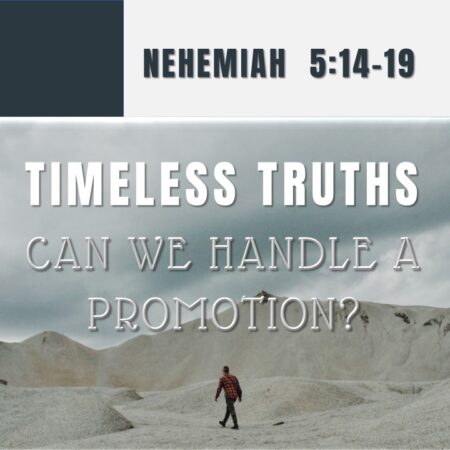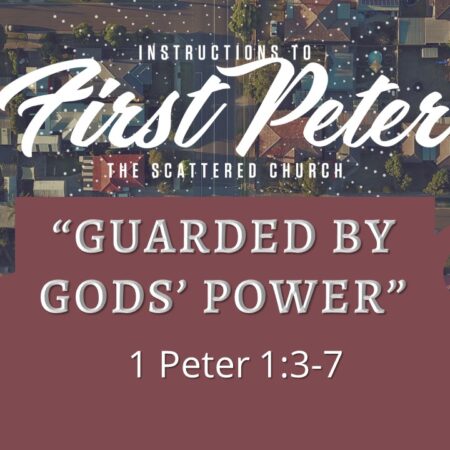Nehemiah 5:14-19 Proverbs 29:2-4 Philippians 2:1-3 Ephesians 5:7-11 Psalm 139:23-24 Chuck Swindoll “Adversity is a painful teacher. Who hasn’t felt its sting? It can be the heartache of unhappy employment…
"Calling" Tagged Sermons
1 Peter 5:1-4 Matthew 20:20-28 Ephesians 4:11-24 Judges 17:6 James I. Packer “Truth & Power” What is Authority? Authority is a relational word which signifies the right to rule. It…
1 Peter 1:3-7 James 1:2-4 James 1:12-15 Matthew 4:1-11 “We are being guarded by God’s power THROUGH FAITH.” Os Guiness in his book “The Call” writes: “All truth in a fallen…
The historian Will Durant made this comment:
“There is not greater drama in human record then the sight of a few Christians, scorned and oppressed by a succession of emperors, bearing all trials with a fearless tenacity, multiplying quietly, but building order, while the enemy generated chaos. Fighting the sword with the Word of God, brutality with hope and at last defeating the strongest empire that history has ever known.
Caesar and Christ had met in the arena, and Christ had won.”
Chuck Swindoll in his commentary on these verses writes:
“During the interval of time between our Lord’s departure from the earth and His return, He is involved in two projects. One; to prepare a place for His children. Two; to prepare His children for a place. He is engaged right now in preparing heaven for His own. That’s what’s happening away from our sight. But on this earth, He is also engaged in preparing us for the life we will live in eternity with Him.”
1. The Journey to Greatness HAS ITS DEMANDS 1 Thessalonians 5:12-13 1 Timothy 5:17 Acts 14:23 2. The Journey to Greatness HAS ITS OBLIGATIONS 1 Thessalonians 5:14-15 Romans 12:18 Ephesians…
The Apostle Paul established this church about A.D. 50-51, when he spent 18 months there on his second missionary journey. We can find these details in Acts 18:1-17. During his 3rd missionary journey, about 5 years later, he stayed in Ephesus for about 3 years, and during this time he received disturbing reports concerning problems among believers in Corinth. He wrote a letter which we know as the lost first letter to this church at Corinth.
Shortly afterward, a delegation sent by a member of the church at Corinth (Chloe) reported to Paul that there were divisive factions in the church. Paul did not immediately respond. Then another delegation from Corinth arrived with a letter asking Paul certain questions (1 Corinthians 7:1 and 16:17). The first thing Paul did was sending Timothy to Corinth to help correct the problems there. (1 Corinthians 4:17). He then also wrote the letter that we know as 1 Corinthians, expecting it to reach Corinth before Timothy would arrive. (16:10)
If we would analyze this letter carefully, we find that Paul responds to 10 separate problems;
• A sectarian spirit
• Incest
• Lawsuits
• Fornication
• Marriage and divorce
• Eating food offered to idols
• Wearing the veil (head covering)
• The Lord’s supper
• Spiritual gifts
• The resurrection of the body
How does the Apostle Paul address all these problems at once?
He reminds the church that they have to rediscover the true foundation, which is Jesus Christ, as a counter to all human boasting.
WE learn that no matter what local church we attend, believing that there is one without problems between individual members would be at best naïve, at worst, deceptive.The question is not if a Bible preaching, Holy Spirit led church can have problems, but rather, HOW CAN SUCH PROBLEMS BE SOLVED AND THE INDIVIDUAL PEOPLE AND THE LOCAL BODY AS A WHOLE LEARN FROM IT AND BECOME BETTER, NOT BITTER.
The purpose of our church is summarized in a single sentence based upon two key Scriptures:
1. A Great Commitment to the GREAT COMMANDMENT
2. A Great Commitment to the GREAT COMMISSION
What does it mean to love the Lord your God with all your heart, with all your soul, and with all your mind? When we deviate just 5% from this commandment and love anything more than God, we are on dangerous grounds. The temptation is always present to love and protect our ministry or people we feel God has given us. Or to love my reputation and my position more than I love God. Or I love a certain program more than I love God.
There is a fundamental flaw in such thinking. WHY?
Because no human being, no program, no ministry, no reputation, no calling, can DO WHAT ONLY GOD CAN DO.
When a program starts making disciples after themselves, it needs to shut down, period. Changing leadership is not the answer, because the culture in a certain ministry has its root in the spiritual place. People begin to think what they have heard or observed, even if it is contrary to Scripture.
This is very important to know, because when our commitment to the program is greater than the commitment to the Lord Himself and his established authority, everything breaks down. Now all we want to be involved in is our program.
The Apostle Paul had to deal with that in in Corinth, and I had to deal with that in our church. While such corrections are painful and easily can be misunderstood or misinterpreted, they are absolutely necessary.
In this church, we always want to be committed to the Great Commandment and the Great Commission. As a family, some of us need to rediscover our foundation and ask the Lord to bring those Biblical truths to our remembrance daily.
Looking at this scene, John as a born Jew and a personal follower of Jesus Christ understands what the Glory of God is. He has heard plenty about the Shechinah Glory appearing during the age of the Biblical Patriarchs and he certainly understood what importance God’s glory has played during the history of the Jewish people. If we want to define God’s Glory, we could say that the Shechinah Glory is the VISIBLE MANIFESTION OF THE PRESENCE OF GOD ALMIGHTY.
Because the Hebrew word Shechinah, which comes from the Root SHACHAN, literally means DWELLING.
The GREEK translation of the HEBREW word SHECHINAH is SKEINEI, which means TABERNACLE.
In the Old Testament most of these visible manifestations took the form of LIGHT, FIRE, OR CLOUD, or sometimes a combination of all of them.
After the glory of moses’ face faded, god manifested his glory through the tabernacle. Notice, that the tabernacle itself had no external beauty. It was covered with weather beaten animal skins. It was God who used the unattractiveness of the tabernacle to reveal and manifest His glory to Israel. The Israelites eventually started to believe that the tabernacle and the ark of the covenant where the source of their blessings. They forgot about the Shechinah Glory, that God dwellt among them.







